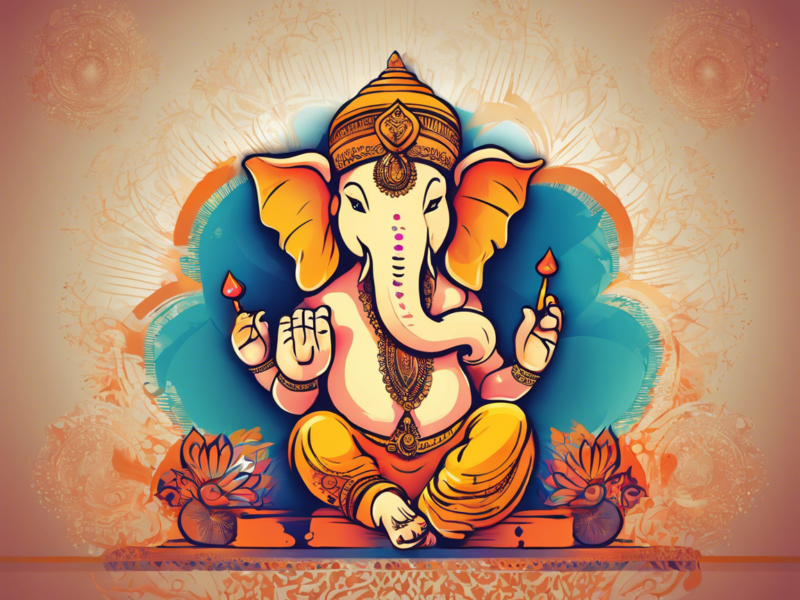Ganesh Chaturthi, also known as Vinayaka Chaturthi, is a popular Hindu festival that celebrates the birth of Lord Ganesha, the elephant-headed god of wisdom, prosperity, and good fortune. This auspicious occasion is observed with great fervor and enthusiasm across India and by Hindus worldwide. The festival typically lasts for 10 days, with the last day culminating in the immersion of Ganesha idols in water bodies.
In 2023, Ganesh Chaturthi will be celebrated on Thursday, 31st August. Devotees perform various rituals, offer prayers, and seek blessings for success, prosperity, and the removal of obstacles during this festival. One of the essential aspects of Ganesh Chaturthi is choosing the auspicious time to perform the rituals and invoke Lord Ganesha’s presence into the idols.
Here, we will explore the best auspicious times for celebrating Ganesh Chaturthi in 2023, as per Hindu Panchang (calendar) and astrology:
Auspicious Timings for Ganesh Chaturthi 2023:
1. ** Ganapati Sthapana Muhurat (Idol Installation):**
- Morning Muhurat: 06:11 AM to 08:04 AM
- Afternoon Muhurat: 10:17 AM to 12:10 PM
- Evening Muhurat: 03:25 PM to 05:18 PM
- Night Muhurat: 06:42 PM to 08:18 PM
2. ** Madhyahna Ganesha Puja Muhurat (Afternoon Puja):**
- Madhyahna Muhurat: 12:10 PM to 02:25 PM
- Duration: 2 Hours 15 Minutes
3. ** Aparahna Ganesha Puja Muhurat (Afternoon Puja):**
- Aparahna Muhurat: 03:57 PM to 06:25 PM
- Duration: 2 Hours 27 Minutes
4. ** Ganapati Visarjan Muhurat (Idol Immersion):**
- Morning Muhurat: 06:46 AM to 07:58 AM
- Afternoon Muhurat: 02:09 PM to 03:44 PM
- Evening Muhurat: 07:13 PM to 09:09 PM
Importance of Auspicious Timing:
Choosing the right muhurat (auspicious time) for essential rituals during Ganesh Chaturthi is believed to enhance the spiritual significance and ensure the blessings of Lord Ganesha upon the devotees. Performing the ceremonies during these specific times is said to amplify the positive energies and vibrations associated with the festival.
Devotees often consult expert astrologers or priests to determine the most propitious timings for conducting Ganesh Chaturthi rituals, including idol installation, puja ceremonies, and immersion. Observing these auspicious timings is considered vital in Hindu traditions to ensure the efficacy and success of the prayers and offerings made to Lord Ganesha.
Regarding Fasting:
Many devotees choose to observe a fast during Ganesh Chaturthi as a mark of devotion and to seek the blessings of Lord Ganesha. Fasting rules may vary based on regional customs and personal preferences. While some people opt for a complete fast without consuming any food or water, others may follow a partial fast by consuming fruits, milk, and specific food items.
It is essential to consult with elders, priests, or knowledgeable individuals regarding the fasting guidelines and rituals associated with Ganesh Chaturthi to observe them correctly and derive spiritual benefits.
Frequently Asked Questions (FAQs) about Ganesh Chaturthi:
1. What is the significance of Ganesh Chaturthi?
Ganesh Chaturthi marks the birthday of Lord Ganesha and symbolizes new beginnings, prosperity, wisdom, and the removal of obstacles. It is a time for devotees to seek the blessings of the elephant-headed deity for success and fulfillment.
2. How long does Ganesh Chaturthi last?
Ganesh Chaturthi typically lasts for 10 days, with the final day known as Ananta Chaturdashi when the Ganesha idols are immersed in water bodies, symbolizing the journey of Lord Ganesha back to his celestial abode.
3. What are the traditional rituals performed during Ganesh Chaturthi?
Traditional rituals during Ganesh Chaturthi include idol installation (sthapana), offering prayers (puja), chanting of mantras, performing aarti, offering modaks (sweets) to Lord Ganesha, and immersion (visarjan) of the idols in water.
4. Can Ganesh Chaturthi be celebrated at home?
Yes, Ganesh Chaturthi can be celebrated at home by installing Ganesha idols, performing puja rituals, offering prayers, and seeking the blessings of Lord Ganesha. Many families create elaborate decorations and conduct community festivities during this period.
5. What are some eco-friendly practices for Ganesh Chaturthi celebrations?
To promote environmental sustainability, devotees can opt for eco-friendly Ganesha idols made from clay or natural materials, use organic decorations, avoid plastic items, immerse idols in artificial ponds for immersion, and engage in tree plantation drives as part of the celebrations.
6. Is it necessary to consult an astrologer for determining the auspicious timings for Ganesh Chaturthi rituals?
While consulting an astrologer or priest for auspicious timings is common practice, it is not mandatory. Devotees can follow general guidelines based on Panchang (Hindu calendar) or seek advice from knowledgeable individuals to conduct Ganesh Chaturthi rituals at appropriate times.
7. What are the main offerings made to Lord Ganesha during Ganesh Chaturthi?
Devotees offer various items to Lord Ganesha, including modaks (sweet dumplings), coconut, jaggery, flowers, durva grass, fruits, incense sticks, and camphor during puja ceremonies. These offerings symbolize devotion, purity, and auspiciousness.
8. Can non-Hindus participate in Ganesh Chaturthi celebrations?
Yes, Ganesh Chaturthi welcomes people of all backgrounds and beliefs to participate in the celebrations, seek the blessings of Lord Ganesha, and experience the cultural richness and spiritual significance of the festival. It fosters unity, harmony, and inclusivity among diverse communities.
9. How is Ganesh Chaturthi celebrated in different regions of India?
Ganesh Chaturthi is celebrated with unique customs and traditions in various regions of India. Maharashtra is renowned for elaborate public processions and community festivities, while states like Tamil Nadu and Andhra Pradesh emphasize cultural performances, music, and dance during the festival.
10. What is the significance of immersing Ganesha idols in water bodies during Ganesh Chaturthi?
The immersion of Ganesha idols in water bodies, known as visarjan, signifies the departure of Lord Ganesha after his temporary stay on earth. It symbolizes the impermanence of life, the cycle of creation and dissolution, and the importance of letting go of attachments to embrace spiritual growth and renewal.




